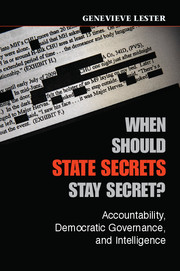Book contents
- Frontmatter
- Dedication
- Contents
- Acknowledgments
- Abbreviations
- 1 An Analytical Approach: Intelligence, Accountability, and Oversight
- 2 Organizing Secrecy: The CIA and Institutional Control
- 3 External Accountability: The Development of Congressional Oversight
- 4 Congress and Oppositional Oversight
- 5 An Independent Judiciary? The Domestic Implications of Intelligence and the Politics of Secret Oversight
- 6 Conclusions and Adapting Oversight Mechanisms for the Future
- Bibliography
- Index
1 - An Analytical Approach: Intelligence, Accountability, and Oversight
Published online by Cambridge University Press: 05 May 2015
- Frontmatter
- Dedication
- Contents
- Acknowledgments
- Abbreviations
- 1 An Analytical Approach: Intelligence, Accountability, and Oversight
- 2 Organizing Secrecy: The CIA and Institutional Control
- 3 External Accountability: The Development of Congressional Oversight
- 4 Congress and Oppositional Oversight
- 5 An Independent Judiciary? The Domestic Implications of Intelligence and the Politics of Secret Oversight
- 6 Conclusions and Adapting Oversight Mechanisms for the Future
- Bibliography
- Index
Summary
For decades Congress and the courts as well as the press and the public have accepted the notion that the control of intelligence activities was the exclusive prerogative of the Chief Executive and his surrogates. The exercise of this power was not questioned or even inquired into by outsiders. Indeed, at times the power was seen as flowing not from the law, but as inherent in the Presidency. Whatever the theory, the fact was that intelligence activities were essentially exempted from the normal system of checks and balances.
This quotation from the final report of the Church Committee – the Senate committee created in 1975 to investigate intelligence abuses – is indicative of the complex position that intelligence continues to hold in the American democracy. Intelligence comes laden with fiction, myths, and mysteries, as befits its unique status in the government and in the public mind. Intelligence activities exacerbate the information asymmetry issues inherent in representative government. The nature of the secret and technical work creates a unique culture distant from the regulatory mechanisms of conventional democratic governance. The problem of overcoming this information asymmetry is the core of accountability and oversight. Mechanisms have developed over several decades to rebalance this relationship and have had varying degrees of success. Total equilibrium, of course, between intelligence actors and overseers will never be achieved due to the nature of the work, its inherent secrecy, and the traditional executive ownership and control of it.
In June 2013, Edward Snowden, a contractor working for the National Security Agency (NSA), leaked a trove of classified documents to which his position gave him access. The leaked documents outlined a range of programs in which the NSA had been engaged that were aimed at the domestic public. The stories first published in the British newspaper The Guardian told readers about massive programs that collected bulk metadata and Internet communications within the United States.
- Type
- Chapter
- Information
- When Should State Secrets Stay Secret?Accountability, Democratic Governance, and Intelligence, pp. 1 - 28Publisher: Cambridge University PressPrint publication year: 2015
- 1
- Cited by



